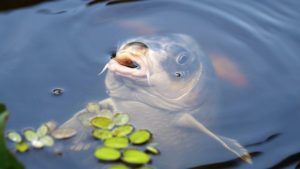The Next Health Catastrophe Will Be From Fish

A fatal form of Infectious Pancreatic Necrosis Virus (IPNV) is slowly spreading. This type of virus is found in fish and isolated in cell culture. It remains one of the most intensely studied viruses in fish till date.
The danger from this virus is more eminent at present as many consumers have started replacing chicken and egg with fish following the bird flu scare.
Fish From Wet Market: Is it Safe?
A study has found that most of the fish farms have high levels of lead and cadmium, which pose a health risk and violate the Food Safety Standards. Both lead and cadmium have the capacity to bond with cells in the human body, thereby causing long term damage to the organs.
Tamil Nadu followed by Andhra Pradesh and West Bengal are worst in terms of aquaculture food safety and health hazards. As per the harm to the environment due to fish farming, Tamil Nadu takes the top position followed by Bihar and Odisha.
Fish raised in these contaminated farms can land up on the plates of consumers, and this can be especially harmful to children and pregnant women. The prophylactic antibiotics which are given to the fish are more dangerous to the aqua ecosystems and so also to humans. Around 40 per cent of the fish farms use prophylactic antibiotics. The usage went during the white-spots disease spotted in prawns and crustaceans during the 90’s.

Majority of the fish farms do not have proper waste management, which has led to nitrogen overload leading to algal blooms.
Another fallout is eutrophication, which is the gradual increase in the concentration of phosphorus, nitrogen, and other plant nutrients in an aging aquatic ecosystem especially in the fish farms as they do not have proper waste management. This cuts off oxygen and fish gasp for breath, making them bloated and sickly. Fish from such aquacultures are diseased and less nutritious.
The other factors responsible for unhealthy fishes laden with viruses are due to human defecation and in some places using the fish ponds for bathing. More so, using soaps while bathing is not good for aquaculture.
Unmonitored and uncontrolled usage of medicines in aquaculture poses quite a threat to the fishes as well as to consumers. Due to this reason, certain strains of virus and bacteria have become resistant. This is much of a concern to us. These undesirable chemicals administered in any life form — animal husbandry, livestock or pisciculture — are dangerous and have an adverse effect on the environment due to imbalance in the ecosystem. Of late, many fish have been found to be laced with formalin to increase shelf life; in this scenario, the enforcement authorities have to take strict note on this.
In Odisha, we do not have any regulations for waste management and severe violations in slaughter protocols. The mismanagement of toxic waste from slaughterhouses and wet markets has damaged the environment. All farms dump their waste near the waste dumps, water bodies and rivers, thereby sending it back for human consumption.
The need of the hour is to have regulation on fish farms and FSSAI should monitor the slaughter of animals in the wet market. As per the regulation in 2011, all animals have to be stunned before the final killing.
Now, we are experiencing the bird flu epidemic along with the COVID-19 outbreak. We all know that one of the sources for these has been the wet market. Along with swine flu, the diseases are zoonotic (also known as zoonoses, which are caused by germs that spread between animals and people).
Despite so many dialectics, however, we are yet to organise and regulate this sector. We are now gaping at another public catastrophe and the source will be from fish.

Comments are closed.